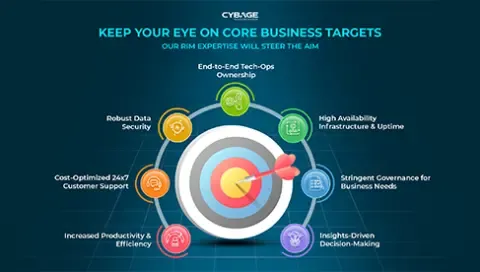“The financial system is being rewired, and Fintech is the wire.”
– Jim Marous, Fintech Author and Speaker
Technologies that deal with finances have been around for a long time. However, in recent years, one term that has become increasingly popular is "FinTech". But what exactly is this concept? Fintech integrates technology into financial services to enhance and automate their delivery and use.
Fintech, the dynamic fusion of finance and technology, is driving the financial sector into a new era of innovation and accessibility. It has affected banking, money transfer, payment, and consumer services. With technologies like Cloud and AI at its forefront, Fintech is reshaping how we manage finances while simultaneously empowering individuals and businesses with unparalleled efficiency.
What is the Difference between Fintech and Conventional Institutions?
Technological advancements continue to change how people conduct businesses, notably within the banking and finance sectors. So, what makes Fintech stand out distinctly from traditional banking, financial services, and insurance (BSFI) institutions? In brief, Fintech fills the gaps left by other financial institutions by reaching more people and changing how services are provided.
Traditional banks operate within rigid structures and legacy systems. However, unlike conventional BSFI institutions, Fintech firms use the latest technology to adapt to market changes and customer demands swiftly. This agility allows them to introduce disruptive solutions and new financial products at a pace that traditional institutions struggle to match. Whether scaling operations, entering new markets, or diversifying product offerings, Fintech firms possess the inherent flexibility to stay ahead of the curve and drive sustained growth.
Traditional institutions rely on proven track records, often prioritizing stability. Fintech, on the other hand, offers more user-friendly solutions. The services are tailored to individual customer needs through advanced data analytics and AI-driven insights, providing a more personalized user experience. This also contrasts with the one-size-fits-all approach in traditional BSFI institutions, where customers often face bureaucratic hurdles and standardized offerings.
Access to technology translates to greater accessibility for Fintech. Therefore, they can expand their market reach beyond what traditional BSFI institutions can achieve by forming strategic partnerships with incumbents, startups, and other stakeholders.
What are the Advantages of Implementing Fintech Solutions?
Fintech offers a whole range of services that cater to the needs of individuals as well as businesses.
1. Greater Reach: As societies become increasingly interconnected and reliant on digital infrastructure, Fintech emerges as a natural progression, offering innovative solutions that transcend geographical boundaries. This accessibility expands the reach of financial services. Secondly, collaboration with banks also helps Fintech reach a broader customer base.
2. Ability to Innovate: Fintech operates in an environment conducive to experimentation, and this agility enables it to develop new solutions to meet evolving customer needs. By constantly pushing the boundaries of what's possible, Fintech firms drive industry-wide innovation, setting new standards and reshaping consumer expectations.
3. Enhanced efficiency: Fintech's prowess stems from its adept utilization of emerging technologies. For instance, AI-powered chatbots streamline customer service, Blockchain ensures transparent and secure transactions, while big data analytics uncovers valuable insights for informed decision-making.
4. Customer-Centricity: Fintech companies enable users to manage their finances quickly and conveniently through intuitive digital platforms and mobile applications. This direct interaction enhances customer satisfaction and allows Fintech firms to gather real-time feedback, iterate rapidly, and tailor offerings to evolving preferences. Fintech firms cultivate trust and loyalty by prioritizing customer engagement and transparency, laying the foundation for long-term relationships.
5. Cost Effectiveness: Technology enables Fintech to offer fast and cost-effective transactions. At the same time, automation significantly reduces operational costs, often gaining an advantage over traditional institutions.
Fintech's Impact on Financial Services
Following are the three key areas where Fintech's impact has been most profound:
Fintech innovations leverage AI algorithms to optimize processes, enhance customer experiences, streamline operations, and deliver personalized services efficiently. AI, data analytics, and platforms such as Microsoft Dynamics 365 Fraud Protection help Fintech companies detect fraud and mitigate risk. The evolution of AI has positively affected Fintech in banking, increasing its efficiency.
Moreover, AI-powered analytics enable Fintech companies to harness vast datasets, make data-driven decisions, and predict future trends. By utilizing vast amounts of data from various sources, Fintech companies can develop more accurate risk assessments, personalized product offerings, and targeted marketing strategies. This data-driven approach enables financial institutions to understand and meet the evolving needs of their customers in real time.
Through digital banking and micro-investment platforms, Fintech has empowered individuals to manage their finances more effectively, regardless of location or socioeconomic status. This democratization has improved financial inclusion and created greater competition within the industry, ultimately benefiting consumers through lower fees, better rates, and increased transparency.
Fintech’s services expand beyond banking and investment and encompass fundraising. Platforms using Fintech IT solutions help users/businesses raise funds for ventures through improved processes and enhanced accessibility.
How are Emerging Technologies Shaping the Future of Fintech?
Fintech companies are at the forefront of using the latest technologies to improve customer delivery, such as:
- Cloud computing: Maintaining sensitive data involves risk; hence, cloud computing is one of Fintech's enablers as it caters to its unique needs. As Fintech continues to evolve, the scalability and agility offered by cloud computing are revamping traditional financial services. With secure data storage and real-time processing capabilities, cloud-based solutions enable Fintech companies to adapt swiftly to market changes while enhancing user accessibility. For example, at Cybage, several of our customer partners leverage cloud technology.
- Internet of Things (IoT): IoT devices help by enabling seamless, data-driven financial transactions and personalized and proactive services. IoT integration enhances security and customer experience, using functionalities such as smart payment terminals, laying the foundation for a hyper-connected financial ecosystem.
- No-code and low-code: The rise of no-code and low-code platforms democratizes Fintech innovation, aiding in the rapid development and deployment of financial applications. Low code tools have gained popularity and play a pivotal role in Fintech innovation. By reducing development time and costs, these platforms help increase collaboration between business stakeholders and IT teams, accelerating the delivery of customer-centric solutions.
- Blockchain Management: Blockchain technology in Fintech offers secure and immutable transaction records that reduce the risk of fraudulent activities. With decentralized ledgers facilitating faster settlements and smart contracts automating agreements, Blockchain offers increased efficiency and transparency through crypto management solutions.
Moreover, as digital payment becomes increasingly necessary, Fintech companies are pioneering payment technology solutions to ease transactions with enhanced security.
However, despite these advancements, there are still gaps to be filled. Challenges such as data security and regulatory compliance still exist and need to be addressed. Fintech consulting service providers (like Cybage) continue to offer services based on the latest technology to bridge the divide between traditional financial services. The ultimate goal is to bring security and simplification to the transactions, assisting individuals and enterprises in achieving their goals.
The use of technology will unlock new possibilities for secure, efficient, and user-centric financial services. As Fintech continues to evolve, understanding its strengths and capacities is necessary for unlocking new opportunities for growth and advancement. After all, Fintech isn't just a trend — it's the future of finance, and the future has never looked more promising.
As we delve deeper into Fintech's transformative power, we would love to hear your thoughts on how traditional financial institutions and Fintech companies leverage strategic partnerships with Software Companies to enhance their services and offerings.















